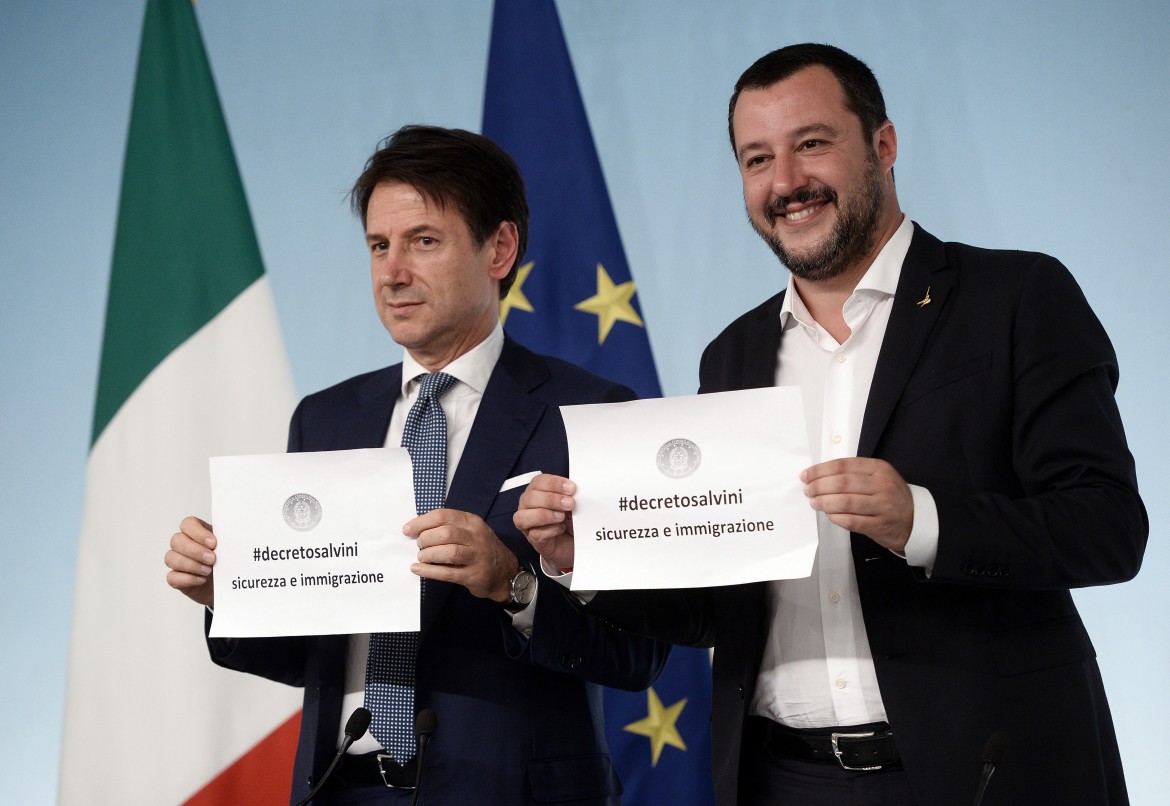Analysis
Italian cabinet approves Salvini’s anti-refugee ‘security’ decree
The measures proposed by Interior Minister Matteo Salvini would make it easy to deport asylum seekers and broadens the list of crimes that could strip refugees of already-granted status. ‘The decree is not set in stone,’ Salvini specified.

Compared with the drafts of Italian Interior Minister Matteo Salvini’s decree on immigration and “security” that have circulated in recent weeks, some of the proposed repressive measures against those who have already obtained refugee status have been removed. Their international protections can now only be revoked after a final conviction for a series of serious crimes.
However, from all the amendments sent in recent days by the experts at the President’s Office, this seems to be the only one that the government actually accepted. This improvement is overshadowed by a sharp restriction of the rights guaranteed to those who have applied for asylum and are waiting for a response from the local asylum commissions. These restrictive measures, together with similar ones contained in the decree, may in fact be unconstitutional.
And some of them—like the abolition of humanitarian protection and the limitations imposed on the System of Protection for Asylum Seekers and Refugees (SPRAR)—may cause a spike in the number of unregistered immigrants, almost impossible to remove from the country and at the same time condemned to a clandestine existence.
The Salvini decree was unanimously approved Monday by the cabinet. “The decree is not set in stone,” the Interior Minister was keen to specify, aware of the existing discontent among his M5S allies with some of the measures it contains, and pointing to the fact that Parliament may intervene to make changes.
Prime Minister Giuseppe Conte also struck a conciliatory note, noting that the text of the decree was already known to President Sergio Mattarella. “There was a back-and-forth,” Conte said at the end of the government meeting. “I’m not saying that Sergio Mattarella gave it the green light; this would not be respectful of institutional etiquette. The president will have ample opportunity to put forward his own comments and proposals.” This clarification, however, cannot shield the government from criticism regarding the provisions of this decree.
Among the measures designed to provoke controversy is the repeal of humanitarian protection, replaced by a temporary residency permit that is only awarded in exceptional cases, of which the decree mentions six: acts of particular value to society, severe labor exploitation, domestic violence, extraordinary natural disasters and extraordinarily serious health reasons.
The decree also features changes to the maximum length of time that a migrant can be detained in Repatriation Centers (CPR), known as “hotspots,” which will be able to be extended to up to 180 days, in line with the provisions of a 2008 European directive. The time for which an asylum seeker can be detained at a hotspot in order to ascertain their identity and nationality is set at 30 days—but even in this case, if difficulties arise with the process of identification, the period of detention can be extended to up to six months.
Also envisaged is the possibility of detaining migrants in “structures available to public security officials,” such as barracks and police stations, in the event of the overcrowding of the CPRs. Once expelled, a migrant will also be prohibited from returning not only to Italy, but to any country in the Schengen area.
Another sensitive point concerns the possibility of denying or even withdrawing internationally recognized refugee status. The decree broadens the categories of crimes for which such measures are possible, including “socially dangerous” crimes such as sexual violence; the manufacture, trafficking and possession of drugs for non-personal use; robbery and extortion; violence or threat against a public official (initially, the list also included mere “resistance” to a public official); assault causing serious or very serious injury; female genital mutilation; and theft and burglary if committed with a deadly weapon.
For asylum seekers, however, the decree will likely say that the examination of their asylum application can be suspended if the migrant has committed a crime. “This will happen in case of an initial court conviction,” Salvini has said. But in the text of the decree that was being circulated last night, there was no mention of the need for an actual conviction, with a provision to suspend examination of an asylum application for the mere initiation of criminal proceedings, resulting in an obligation to leave Italy. In the event of a final judgment of acquittal, the applicant would have 12 months to request that the commission restart the examination of their asylum application.
Bad news also for SPRAR, the refugee integration program managed by local municipalities. In the future, the only ones allowed to make use of this system will be those to whom international refugee status has already been granted and unaccompanied minors. All others will have to be held in Extraordinary Reception Centers (CAS), which is likely to result in purpose-built mega-centers and tensions with the local population.
Originally published at https://ilmanifesto.it/profughi-salvini-mette-fine-alla-protezione/ on 2018-09-25
